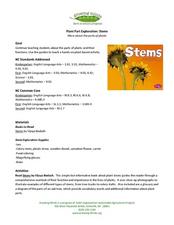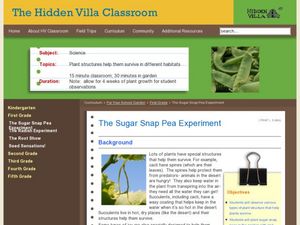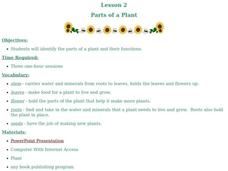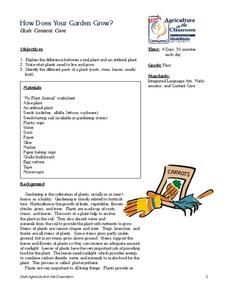Cornell University
Plant Cell Crime Scene
Use science to solve the mystery of the Poplar murder. Pupils use forensic botany to determine if a suspect could be the killer. By analyzing images from a Transmission Electron Microscope, learners determine if the material found on the...
Curated OER
Plant Part Exploration: Stems
Explore water transport in plant stems using this fun experiment! Your scientists will start by reading Stems by Vijaya Bodach. Then, activate prior knowledge about plant stem functions and water transportation....
Curated OER
The Sugar Snap Pea Experiment
Students examine types of plant structure. In this plant biology lesson, students observe various types of plants, such as ivy and grapes, and discuss the differences in structure. Additionally, students plant sugar snap peas, using a...
Curated OER
Using Plant Pigments to Link a Suspect to a Crime
Students use chromatography to separate plant pigments collected from a fictitious crime scene and suspects. They compare the Rf values of the plant pigments to determine whether the plant pigments found on any of the suspects match the...
Curated OER
Parts of a Plant
Students identify the parts of a plant and their functions. In this plant biology lesson, students view a PowerPoint presentation on plants and their parts and discuss the functions of each part. Students observe a real plant and...
Curated OER
Tops and Bottoms
First graders classify vegetables by which parts are edible. In this plant biology lesson, 1st graders are read Tops and Bottoms by Janet Stevens, participate in a discussion of which plant parts are edible in the story, then sort...
Nuffield Foundation
Measuring Rate of Water Uptake by a Plant Shoot Using a Potometer
How quickly does a plant transpire? Learners explore this question through measuring water uptake with a potometer. They time the movement of a bubble a set distance to understand the motion and rate of speed.
Curated OER
Plant Transpiration
Students conduct various experiments to investigate plant transpiration. In this biology lesson, students explain how this process helps maintain the hydrologic cycle. They measure the rate of water loss in plants using a potometer.
Curated OER
Plant Needs
Students explore the needs of plants. In this plants biology lesson, students work in groups to perform an experiment with tomato plants. Each group records observations in a journal, takes pictures, and interprets the...
Curated OER
Look At Those Leaves
Students observe leaves. In this plant biology lesson, students examine leaves and classify them according to size, shape, and color. Students learn more about the leaves by visiting suggested websites.
Curated OER
Look at Those Leaves!
Students observe and sort tree leaves. In this plant biology lesson, students observe various types of leaves and identify the characteristics of each leaf. Students measure and sort leaves according to size and color.
Curated OER
Look At Those Leaves!
Students sort tree leaves. In this plant biology lesson, students collect leaves and group them according to size, shape, and color. Students discuss their observations.
Curated OER
Parts of a Plant
Students explore biology by listening to an in-class lecture. In this plant science lesson, students sing songs with their classmates regarding anatomical parts of a plant and create plants from arts and crafts materials. Students listen...
Curated OER
How Does Your Garden Grow?
Learners identify what plants need to grow. In this plant biology lesson, students analyze the differences between an artificial plant and a live plant. Learners plant seeds and discuss what plants need to grow. Students observe the...
Chicago Botanic Garden
Seasons of a Plant
The third in a series of six lessons is an engaging three-part activity defines that discusses phenology, focusing on the cyclic seasons of plants. Pupils then observe phenology outside before determining how climate change can...
Curated OER
Watch Me Grow
Students observe that plants need air, food, light, and water to survive. In this plant biology lesson, students observe the growth and development of two plants, one is the control plant and the other is denied either air, water,...
Curated OER
Amazing Bean Races
Students experiment with bean growth in varied conditions. In this plant biology lesson, students plant beans in soil and in spun cellulose (absorbent material in diapers) and measure the growth of their seedlings. They...
Curated OER
Leaf Scavenger Hunt
Learners participate in leaf scavenger hunt. In this plant biology lesson, students take a trip to the Mandalay National Wildlife Refuge and collect and identify leaf samples.
Curated OER
CELL TRANSFORMATION IN TOBACCO LEAF DISKS
Students work with whole plant material and are not required to measure small quantities, yet they can see evidence of transformed plant cells (plant cells that have genes from bacterial plasmids). This is a laboratory suitable for...
Curated OER
Ecology
Learners explore, experience and experiment identifying the human impact on the environment of vegetative differences within the same biome. They assess what causes deserts, rain forests, savannahs, tundras and saguaros and how these...
Curated OER
Evidence of Photosynthesis
Hands on science is the way to go! Learners conduct a lab experiment to help them explain how plants make food through photosynthesis. They test for the presence of starch in leaves using iodine solution and identify the basic things...
Curated OER
Birth of a Plant From a Seed
Students sow seeds of learning. For this biology lesson plan, students label parts of a dicotyledon seed by function as well as by proper names.
Curated OER
Chlorophyll
Students explain the importance of chlorophyll in plants. In this biology lesson, students extract chlorophyll from different plant sources using chromatography. They discover the different factors needed for photosynthesis to take place.
Curated OER
The Great Pollinators
Students discover the reproductive parts of a plant. In this biology lesson, students identify and categorize several different plants they dissect in class. Students record their information using a data chart.

























